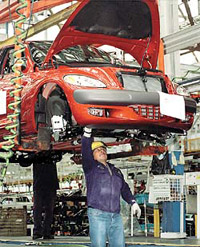 |
 |
 |
 Business News | June 2005 Business News | June 2005  
Mexico's Carmakers in a Ditch
 Geri Smith - BusinessWeek Online Geri Smith - BusinessWeek Online


| | A Chrysler employee works at the plant in Toluca, Mexico. (Photo: Claudio Cruz/Associated Press) |
Out in the middle of Mexico's searing Sonoran desert, Ford Motor Co.'s Hermosillo plant is humming. Clipboard-toting supervisors watch as assembly-line workers install final accessories on test-run production of the new Fusion model. On Aug. 1 the facility will start producing Ford Fusion, Mercury Milan, and Lincoln Zephyr midsize passenger cars, building up to a pace of 300,000 annually. It's one of Ford's most important vehicle launches of the year - an effort by the Dearborn (Mich.) auto maker to stem its loss of U.S. passenger-car sales to Asian and European rivals.

For Mexico, the Ford launch is something more important as well. It's an attempt to bring back the glory days of the country's auto industry, a $35 billion business that accounts for a fifth of the country's manufacturing output. It employs a half-million people, including some 55,000 auto-assembly workers whose lucrative jobs are tickets to Mexico's growing middle class. Three-quarters of Mexican-made vehicles are exported to the U.S., largely by Detroit's Big Three but also by German giant Volkswagen.

It's impressive - until you consider how much the industry has slipped from its peak. Reduced U.S. demand for Ford, General Motors (GM ), and VW models means exports of automobiles and light trucks from Mexico have dropped 31% since 2000, to 1.1 million. Ford has been one of the hardest hit: Its exports plummeted from 235,000 in 2000 to just 70,200 last year. The decline was partly due to the switchover to new models like the Fusion, but disastrous sales in the U.S. have had their impact, too. GM has been hammered: Just in the first quarter of 2005, exports from its three Mexican assembly plants fell 24.5% as American consumers shunned gas-guzzling SUVs such as the Mexican-made Chevy Suburban and Avalanche. Chrysler's (DCX ) production was also down in the first four months of the year, but only 6%, since its Mexican-made Ram trucks and PT Cruisers continue to sell well in the U.S. Meanwhile, Delphi Corp. (DPH ), the largest auto-parts maker in the U.S., has cut 20% of its Mexican workforce since 2000. "Our auto industry is very vulnerable to the ups and downs of the American economy," says Humberto Jasso, director of industry and technology for Mexico's Economy Secretariat.

What can Mexico do? Marc Scheinman, a Pace University expert on the Latin American auto industry, says the government may have to offer investment incentives to foreign auto makers and slash taxes on domestic car sales to stimulate the industry. "The Mexican government should aggressively target the automotive industry as the goose that lays the golden egg," he says. But officials note that Mexico has garnered more than $9 billion in auto-sector investment since 1999 without offering costly incentives.

More promising is the free-trade strategy Mexico has been using to build on the effects of NAFTA. Mexico now has free-trade pacts with the European Union and much of Latin America, and it just inaugurated an agreement with Japan. That means Japanese and European carmakers will be able to set up shop in Mexico, import parts from their home countries, and ship made-in-Mexico cars to Europe, Japan, or the U.S. - all without paying tariffs. Lured in part by these arrangements, Toyota Motor Corp. (TM ) last December began producing Tacoma pickup trucks for the U.S. at a new facility in Tijuana. Similar logic is driving Volkswagen, whose exports from Mexico have dropped by half since 2000, to ready its Puebla factory for the launch of a new Jetta for the U.S. and European markets.

So far, though, such investment hasn't made up for the steep production shortfalls of Ford, GM, and VW in Mexico. The Mexicans have to hope that the struggling auto makers' new models will help them rebound, with the help of Mexico's flexible union rules and cheap labor. Mexican plants are considered efficient and have consistently high quality ratings. And assembly-line workers take home $8 to $10 an hour in pay and benefits - a high wage in Mexico, but a bargain compared with the $60 it costs to employ the average U.S. unionized worker. Although labor costs account for just 10% to 15% of a finished car's cost, that margin can make a difference to Detroit's beleaguered auto makers.

That's why Ford is hiring 500 new workers and spending $1.2 billion to upgrade the Hermosillo plant, while its key suppliers are investing an additional $400 million at a new, adjacent industrial park. There, companies such as Magna International Inc.'s Cosma Structural Systems are gearing up to build pre-assembled modules that will be sent via a new tunnel to the Ford plant. "Ford is doing everything possible to reduce the time it takes to get our product to market," says Ford plant manager José Islas.

For auto-parts suppliers, one way to weather the current crisis is to look beyond Mexico. Monterrey-based Nemak, a maker of aluminum engine heads and blocks, is one of Mexico's leading auto-parts makers; it's a joint venture in which Ford owns a 20% share. Although two-thirds of its production still goes to Ford and GM, Nemak is diversifying to other carmakers with its lightweight, fuel-efficient components. Today 5 of its 10 plants are abroad - from Canada to Germany to the Czech Republic. "Even though we are manufacturing fewer engines for the Big Three, our overall business is growing," says Chief Financial Officer Salvador Ramos. The same can't be said for Mexico's auto industry. But if the hoped-for rebound happens, the talent and drive are there to get Mexican factories cranked up again. | 
 | |
 |



